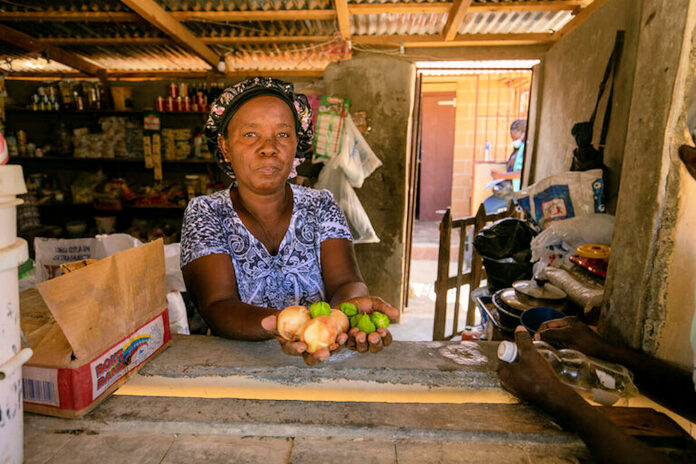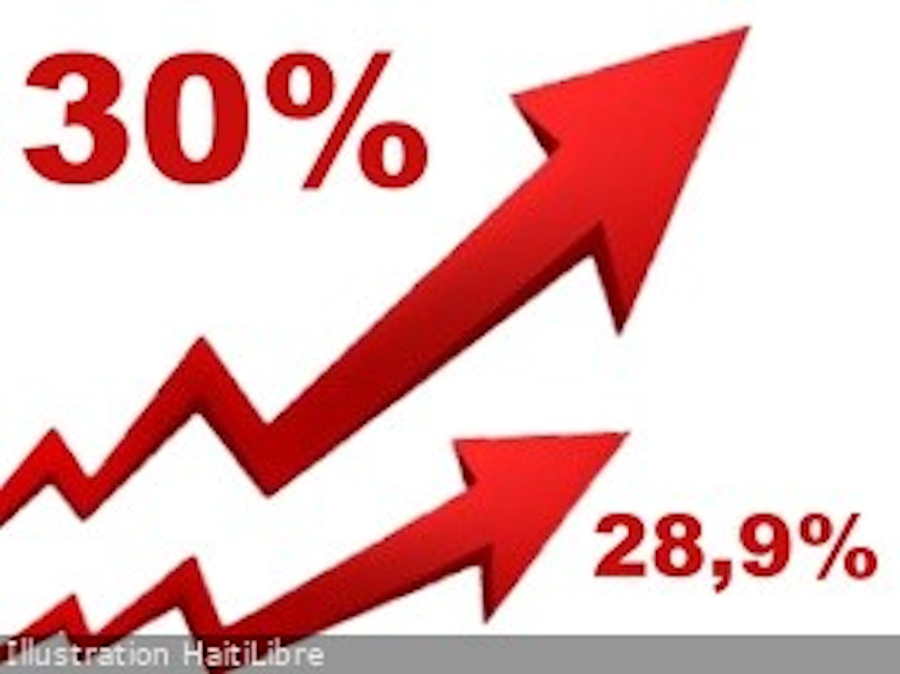
(Français)
The Haitian State is repressing Haiti’s masses by importing foreign military occupation troops, called the Multinational Security Support Mission (MSS), to reinforce the Haitian National Police (PNH), the traditional counterinsurgency force deployed by the international and local ruling classes.
The State is also looking to bolster the Armed Forces of Haiti (FAdH), which has historically been the ruling classes’ principal hammer to keep the masses down. Although disbanded in 1995, the force was relaunched in 2017.
But the puppet government of de facto Prime Minister Garry Conille and the nine-member Transitional Presidential Council (CPT) are also using what could be called economic or financial repression.
The MSS has not been going well. It is plagued by low morale and shortages and delays in the delivery equipment and ammunition as well as the deployment of forces. Blessed by the UN Security Council (with Russia and China abstaining) on Oct. 2, 2023, its first 200 Kenyan troops could not deploy in Haiti until Jun. 25, 2024. Another 200 Kenyans arrived on Jul. 16, three weeks later, bringing the MSS current force strength to a mere 400 Kenyans, who have spent most of their time in their U.S.-built base. The MSS is supposed to eventually amount to over 2,500 soldiers from 10 nations.

The main problem is money. “While the United States has contributed $369 million in money, equipment and services, a UN fund [for the MSS] only has about $68 million, leaving it over $150 million short of the estimated $589 million needed for the first year’s operations,” Reuters reports.
Too make matters worse, those 400 deployed Kenyans are discouraged by bait-and-switch salary tactics. “For those already in Haiti, uncertainty around pay has weighed on morale,” Reuters explained. “The officers were told in Kenya that they would receive monthly bonuses of around $1,500, several times their regular salaries, two officers said, adding they never signed contracts and were not told when they would be paid… [On Sep. 2], some officers had received [bonuses] while others had not, three officers said. But they said they were given no explanation for how their pay was calculated, with some only receiving about $750.”
“It is very demoralizing,” a senior officer told Reuters.
Rank-and-file soldiers were already disgruntled about their much lower pay, Haïti Liberté reported in July.
Meanwhile, PNH cops are still being sent out with hardly any ammunition, a trusted source says. Some six million rounds of 9mm, .762, and .556 ammo bound for Haiti have been sitting since last year on palettes at AmeriJet’s hangar in Miami, all due to corruption and incompetence in both the PNH bureaucracy and that of the U.S. Embassy’s Bureau of International Narcotics and Law Enforcement (INL) unit.
Faced with these problems in both the MSS and PNH, the Conille government aims to beef up the FAdH. According to the National Defense Ministry’s website, some 4,981 signed up to take the “intellectual exams” on Sep. 1 to become soldiers in the force which now numbers between only 1,500 to 2,000.

“Thousands of young Haitians are jumping at the chance to become soldiers as widespread gang violence creates a rare job opportunity in a deeply impoverished country where work is scarce,” the Associated Press reported this week.
Ironically, the need for military repression is being fueled by the Haitian government’s just unveiled austerity budget, an expression of economic repression.
According to economist Simone Wapler, financial repression is “an arsenal of measures that allow States to reduce the cost of their debts by manipulating the markets and their citizens.” In Haiti, the anti-national State has taken a whole series of economic measures to maintain the proletarian masses in living conditions that border on slavery.
These include: setting interest rates at almost zero to lend money to bankers, financiers, and other business sector groups; paying remittances from Haitians living abroad in the local currency, the gourde; increasing the value added tax (VAT); and promoting the increase in the prices of basic necessities.
Haitians have endured tax repression where the masses pay the largest share of the national tax base
Indeed, according to the Haitian Institute of Statistics and Information’s (IHSI) latest report in July 2024, the general consumer price index (CPI) has maintained its inflationary progression from 317.9 in July 2023 to 413.3 in July 2024, an annual increase of 30%.
No public investment to improve the living conditions of Haiti’s impoverished masses is planned in the 2023-2024 “rectified” budget published last week in Le Moniteur. It only contained the same old tricks which promote corruption, cost overruns, and the embezzlement of public funds through bogus programs which will not lift the national economy by increasing state tax revenues or national production. The construction of new irrigation systems should have been the priority, since such labor-intensive works create economic benefits like increased tax revenues while facilitating the revival of national food production, which would address the dire food insecurity crisis faced by nearly half a million Haitians.
Instead, the Haitian State has chosen to hand out cash willy-nilly to random categories of people.
On what criteria will the Haiti’s State choose the beneficiaries of the cash transfer to more than 25,000 households in Haiti’s ten geographical departments, or 2,500 households on average per department? On what criteria will the government choose the 35,000 assembly factory employees for financial support? On what criteria will it grant a targeted subsidy to 25,000 public transport operators? How will the State proceed with giving money to more than 280,000 parents of schoolchildren in national schools in seven of Haiti’s geographical departments, i.e. 40,000 parents on average per department?
On the basis of what criteria and how will the public treasury distribute 61,230 “solidarity baskets” to vulnerable households through the Ministry of Agriculture, Natural Resources and Rural Development, in addition to installing 400 “community restaurants” throughout the country?
Donations from the Food Shock Window (FSW) program of the International Monetary Fund (IMF) will be squandered like the millions of dollars for reconstruction after the Jan. 12, 2010 earthquake and the development funds borrowed from oil sales under the the PetroCaribe program. The masses’ impoverishment will grow without a revolutionary government’s program of real economic and social development that would transform today’s economic system into a socialist economy, based on the formula: “From each according to his abilities, to each according to his needs.”
The annual inflation rate of 30% constitutes a crime against Haiti’s masses, a form of economic repression, coupled with tax repression where the masses pay more taxes than the more privileged layers of Haitian society, where the private sector benefits from all tax and commercial advantages in addition to their practice of tax evasion (smuggling) and corruption (overcharging), while the Catholic Church is subsidized by the State.
The prices of food products and non-alcoholic beverages increased by 42.3% over the period from July 2023 to July 2024; clothing and footwear items shot up 22.2%; housing, water, gas, electricity, and other fuels increased by 18.7%.

The economic repression is deepened when the two cellphone monopolies, Digicel and Natcom, without improving their technical service, have increased the price of communication in Haiti by 42.2% in one year.
Meanwhile, importers, in complete freedom and without worry, despite the stability of the gourde against the U.S. dollar, increased the price of rice by 55.9%, corn by 48.7%, millet by 50.1%, meat by 41.7%, fresh fish by 44.3%, herring by 41.6%, edible oil by 44%, lemons by 90.7%, bananas by 44.2%, fabrics by 23.1%, dresses by 24.2%, tights by 24.5%, suits and universal jackets by 23.6%, housing rent by 18.9%, charcoal by 27.5%, propane gas by 24.2%, meals consumed outside by 30.5%. All this inflation in a country where unemployment is raging and formally affects 16% of the active population in Haiti.
Even the prices of local products have increased by 29.7% to reinforce the economic repression on the Haitian masses.
The least affected regions in Haiti, according to the IHSI, were the departments of the Center and Artibonite with an increase of 28.5%, and the “Great North” (the North, Northeast, and Northwest departments) with an inflationary increase of 28.1%.
Since founding father Jean-Jacques Dessalines’ assassination on Oct. 17, 1806, this is the somber scenario that Haitians have endured: political repression and exclusion of the masses, economic repression for the benefit of local importers and their foreign masters, commercial repression made of economic and commercial monopolies, tax repression where the masses pay the largest share of the national tax base, financial repression where the popular masses pay the highest interest rate on borrowing and earn the lowest interest rate on savings.
Haitian progressives, let us unite to carry out a national liberation struggle for Haiti.
Notes:
1) Simone Wapler is a journalist and economic author. She was long-time editor-in-chief of Agora Publications, paid newsletters specializing in financial analysis and advice founded by Bill Bonner.
2) Data taken from Table 1: Evolution of the Consumer Price Index of the IHSI Monthly Bulletin, JULY 2024.
3) Unemployment rate reference: World Food Programme, Country Strategic Plan, Haiti 2024-2028 Analysis of the country situation, page 7 no 23.










[…] The Haitian State is Using Both Military and Economic Repression Against Haiti’s Impoverished, Reb… Haiti Liberte […]